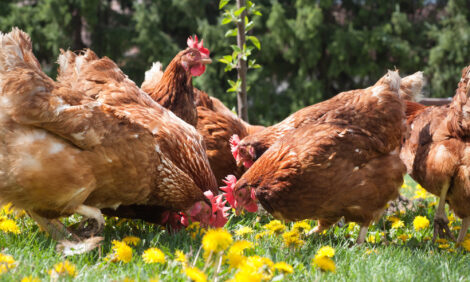



States Join Missouri Lawsuit Targeting Animal Welfare
US - The decision by five states to join a lawsuit attacking a California animal welfare and food safety law may have far-reaching implications for a raft of state laws that protect agriculture and consumers, reports The Humane Society of the United States (HSUS).According to HSUS, the effort by Alabama, Iowa, Kentucky, Nebraska and Oklahoma to join a lawsuit attacking a duly enacted California statute to promote animal welfare and food safety was criticised by The Humane Society of the United States.
"State officials trying to curry favor with agribusiness interests are letting their political grandstanding trump their better judgment about the rights of states to make laws and about the wisdom of having some minimal standards for the care of animals," said Wayne Pacelle, president and CEO of The Humane Society of the United States.
HSUS reports that the lawsuit, initiated by Missouri Attorney General Chris Koster, targets a California law requiring that shell eggs sold in the state come from hens that have enough space to turn around and spread their wings. But the legal challenge could have implications for a raft of state laws duly adopted by legislatures and departments of agriculture that protect agriculture and food safety and reflect the values of the states’ citizens. It puts at risk all state laws on agricultural imports, including on the labeling of seeds and weeds, the sale of adulterated commercial feed, the health of hogs and milk products entering the state, and the testing of cattle for brucellosis, tuberculosis, and other diseases.
"State lawmakers and agriculture departments have real work to do, and the underlying basis of this lawsuit is to allow the federal government to trump state law as it wishes on agriculture policy," said Kevin Fulton, a Nebraska cattle rancher who heads the HSUS Nebraska Agriculture Council. "Whether it’s setting requirements for the import of livestock infected with brucellosis or tuberculosis, for firewood infested with termites, or for eggs from hens confined in barren battery cages that are more likely to carry Salmonella, states have a right to make their own decisions."
Iowa, the largest egg producer in the country, recently was home to a Salmonella outbreak, resulting in people being sickened across the country and prompting the recall of 500 million eggs. There have been nearly 20 studies published in recent years comparing caged and cage-free egg operations, and almost all found significantly higher rates of Salmonella in the caged facilities. California—and every other state—has a right under the US Constitution to regulate or eliminate an unsafe and inhumane product from its local market, regardless of the product’s place of origin.
"Producers from all of these states can sell into California, as long as they adhere to reasonable and safe animal husbandry practices," said Chris Petersen, an Iowa pork producer and a member of the HSUS Iowa Agriculture Council. "California is not asking anything more of out-of-state farmers than in-state producers."
Because so many state laws on the books regulate the sales and imports of agricultural products, the laws put at risk by this legal challenge include those in the very states filing the lawsuit, such as:
- Alabama laws on emission regulations for grain elevators, and labeling requirements for beer and wine.
- Iowa laws requiring testing of swine for brucellosis before entering the state, setting standards for the sale of corn, soybeans and vegetable seeds, mandating segregation of dairy cattle to be moved to slaughter, requiring labeling of artificial sweeteners in products sold in the state, and packaging requirements for eggs sold in the state.
- Kentucky laws on the labeling of wine and liquor, and licensing for out-of-state brewers and microbrewers.
- Missouri laws blocking imports of livestock, poultry, and exotic animals from other states depending on flock’s certification under health programs.
- Oklahoma laws relating to the branding and tagging of cattle, making it unlawful to move livestock into or out of a quarantine area, governing vaccines given to broiler chickens, requiring standards for milk products sold in the state, and banning the sale of horse meat for human consumption.
According to HSUS, the Ninth Circuit Court of Appeals, the appellate court likely to hear this case at some point, recently rejected a very similar challenge to the one Missouri and the other states are bringing, over California’s ban on force feeding birds to produce foie gras, and the sale of products from force-fed birds. The court held that the foie gras law was well within the state’s broad authority to enact humane laws and prevent animal cruelty.
"It’s just not appropriate to jam six or eight birds in tiny spaces so they cannot move," added Mr Pacelle. "These states should stop trying to force their sub-standard products on California consumers, even though the California legislature has declared such products to be at odds with the state’s values and a threat to public health."









